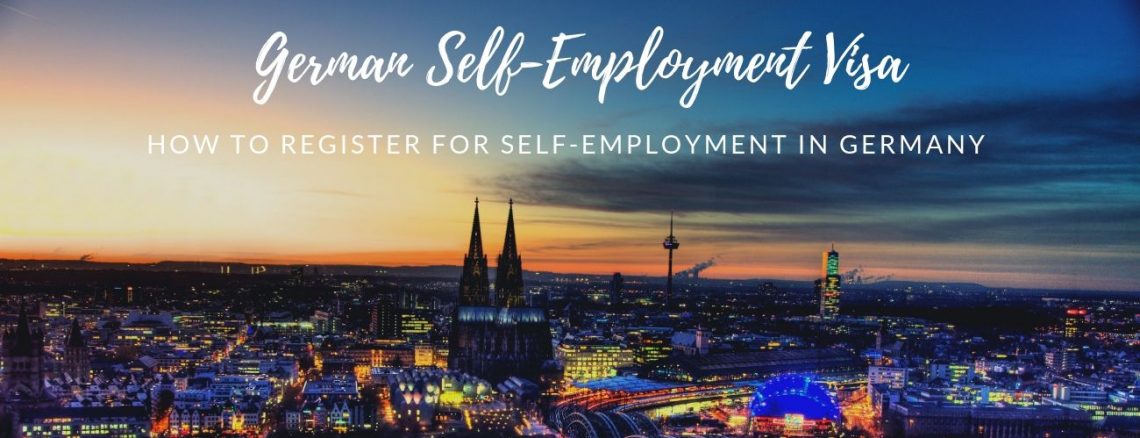
How to Register for Self-Employment in Germany
Top Takeaways From This Post
Last updated on December 22nd, 2022 at 08:26 pm
Do you intend to become self-employed in Germany? Learn how to register as a freelancer in Germany in this step by step guide.
As you know that there are only two things certain in life – death and paying German taxes.
Before you earn a single penny from your freelance or trade, you have to register for self-employment in Germany. This is done at your local tax office or Finanzamt.
Successful registration as a freelancer in Germany allows you to send your clients invoices or sell your goods and services legally. And get paid. And then get taxed.
There are three key tax numbers that you need in order to officially become a freelancer in Germany.
- German Tax ID Number (mandatory)
- German Freelancer Tax Number (mandatory)
- VAT number (circumstantial)
You get the last two tax numbers by registering as a freelancer in Germany.
Let’s break it down and go through the process step by step to register as a freelancer in Germany.

1) Prepare For the Registration Process
This procedure to register as a freelancer in Germany starts with the submission of a completed ‘Tax Number Registration Form’, called “Fragebogen zur Steuerlichen Erfassung” at the Finanzamt of the city where you’re registered as a resident.
By using details from this form Finanzamt is able to register you as a freelancer in Germany and assign you a German freelancer tax number.
The Steuernummer comes in a XX/XXX/XXXXX format. Only self-employed people and businesses need this tax number.
Before you fill out this form, collect the following information:
1.1) Find Out Your German Tax ID
Also known as Steuer-ID (Tax ID) or Steueridentifikationsnummer (Tax ID number) or Identifikationsnummer (Identification Number).
Anyone and everyone in Germany- freelancer, business owner, or salaried, or intern, need this number to be able to work, get paid & pay taxes according to their tax bracket.
According to Federal Central Tax Office or Bundeszentralamt für Steuern,
All individuals receive an 11-digit identification number to ensure their unique identification within the German tax system. The number will not change if you move home or marry. It will be attached to you for your whole life. It does not contain any information about you or the tax office responsible for your tax affairs.
This tax ID number comes in a XX XXX XXX XXX format.
You receive this tax ID automatically by snail mail roughly two weeks after registering your address for the first time in Germany. If you somehow misplace this number, you can request your German tax ID very conveniently through this online form.
Bear in mind that it’ll take a few weeks to process your tax ID. You can receive it in about four weeks or more by post. Read more information about the tax ID here!
Once you have your Identifikationsnummer, you can start the process to register as a freelancer in Germany at your local Finanzamt.
1.2) Find Out Your Responsible Finanzamt
This one is easy!
You can search for your responsible Finanzamt by using the search terms ‘your city’ + Finanzamt. Usually, the first search result will be correct.
In the case of big cities, you may see multiple Finanzamt offices like ‘Finanzamt Nürnberg-Süd’, ‘Finanzamt Nürnberg-Nord’ and ‘Zentralfinanzamt Nürnberg’.
In such cases, just type in ‘your district + ‘zuständiges Finanzamt’. Sometimes typing in with your postcode can also lead you in the right direction.
You need this information to add to your German freelancer registration form.
1.3) Find Out Your Self-Employment Type
Note how I have been using the phrase ‘self-employment’ and ‘self-employed entity’ throughout this post. That is because in Germany self-employment is divided into certain categories and sub-categories.
If you are unsure then read this post to determine what kind of self-employment you fit in – Freiberufler or Gewerbe?
But if you are in a hurry, here is a quick overview:
A freelancer is a self-employed person who practices one of the free professions (freie Berufe). Only certain professions are categorised as freie Berufe in Germany.
Freie Berufe has two subcategories:
- Katalogberufe (catalogue professions)
These professions are heavily regulated and one requires a license to practice them. Some of the classic Katalogberufe are:
- Medical professions: e.g. doctor, dentist, physiotherapist
- Law and business counselling professions: e.g. tax counsellor, lawyer, notary
- Scientific-technical professions: e.g. chemist, engineer, architect
- Media and language professions: e.g. translator, interpreter, journalist
See the full list here (scroll to page 8)
- Katalogähnliche Berufe or ähnliche Berufe (similar to catalogue professions)
They are called ähnliche Berufe because they are similar to the catalogue professions. The training or the concrete professional activity is comparable with a catalogue occupation.
If your profession is not listed in the catalogue professions, you may wanna take a look at the ‘similar (to) catalogue professions’.
You can find the entire list of ähnliche Berufe in this list (scroll to page 9).

If your profession is in any of the above categories, you are a freelancer (Freiberufler). You can register as a freelancer in Germany.
If your profession is not in any one of the above categories, you are a trader (Gewerbetreibender). You have to register your self-employment as a Gewerbe.
Based on how you describe your profession in the registration form, your Finanzamt will register you either as a freelancer (Freiberufler) or a trader (Gewerbetreibender).
As mentioned in my German self-employment visa post, making sure to register as self-employed in Germany correctly is very critical and can impact your freelancer taxes and yearly accounting when the time comes.
Read here how to file ALL your German freelancer taxes in English (and for free if you are a Kleinunternehmer!)
1.4) Find Out If You Need a VAT Number
The Umsatzsteuer-Identifikationsnummer, USt-Identifikationsnummer or USt-IdNr. is the German term for the VAT number.
It’s a 9-digit number with the format DEXXXXXXXXX.
You also get a VAT number by filling up the Fragebogen zur Steuerlichen Erfassung.
Generally speaking, if you create revenue with your self-employment, you have to pay taxes on that. Income tax (Umsatzsteuer) is often called “Mehrwertsteuer” in Germany.
As of January 2020, if your annual income is lower than 22.000 euros, you are classified as a small business owner and therefore will be exempt from VAT. This is called Kleinunternehmerregelung.
“Kleinunternehmerregelung” means small business regulation.
You will not get a VAT number if you declare yourself as a small business owner (Kleintunternehmer) since small businesses do not charge VAT.
2) Fill up German Freelance Tax Number Registration Form
You can fill out this form online on the website of Bundesministerium der Finanzen.
Note that, each session is valid for 45 minutes only. If you take longer than this, the form will refresh and you will lose all your data.
If you use this option, then I would recommend first filling up all values in a paper sheet, and then adding in your online form. Once filled, you can download the form and print it out.
In summary, to fill this form completely, you should have some basic details ready.
- Your German tax ID number or Identifikationsnummer
- Your personal details
- Your bank details
- An exact description of your future self-employment activity
- Financial details of your future self-employment activity
Protip: You can also use an online tool like Accountable that lets you register as a freelancer in Germany at Finanzamt for free.
3) Submit Your Self-Employment Registration Form to Finanzamt
Once you have completed this form, check and recheck the details to make sure you have added accurate info. Once done, you are now ready to submit your form to your responsible Finanzamt.
Make sure that you have your Finanzamt office correctly located.
You can deliver this form in person to the Finanzamt. No appointment is required for this, but make sure to check the opening times on the website.
You can also mail this form to your responsible Finanzamt. Use registered mail for sending the form and all attachments.
You should receive your Tax number (Steuernummer) and VAT number (Umsatzsteuernummer) by mail in about a month.
Unlike your Identifikationsnummer, your Steuernummer is not permanent.
If you move your business to an area served by a different Finanzamt, you will need to get a new one Steuernummer. Which means, going through the same process all over again.
My first time registering went quite fast, and this was in Ilmenau, Thuringia. The second time was in Bayern. It took almost two months to receive my tax number (and they sent me TWO different tax numbers in one mail!?).
In my experience, it helps to call the Finanzamt and follow up with them on your case.
Side Note: You are required by German law to add your VAT number to your business website’s Impressum page. Not doing so could result in hefty fines to some German law sharks.

You May Be Interested In How to fill out your freelancer registration form (Fragebogen zur Steuerlichen Erfassung) line by line.
Phew, so that was it. Did you ever register for Self-Employment in Germany? If yes, how was your experience? Was it complicated or a breeze? Let us know in the comments.






14 Comments
Dhruvin Mangukia
Hello Yamini,
I finished my master study in June 2020. I am doing online trading in financial markets for different asset classes and along with that I am also working part-time in a restaurant. As you know that after studies we have 18 month of work visa, which in my case is going to end in Feb-22. I have a specialized knowledge in stock market through my master thesis and practical experience of more than 2 years, I wanted to get self emplyoed visa to stay longer in germany based on that as I have no plan of doing full-time job. So my question is do they include online trading in freelancing for self employment. I have my own capital that I can show in bank account. As I do not have any client, So I think Vat ID is also not requied. As we know that profits in finanial market is not fixed so I also want to continue my part-time job.
Based on this situation, is it possible to get freelancer visa? If could help me out it would be great.
Thank you in advance. 🙂
Yamini
Hey Dhruv,
I’m afraid, I’m not adequately informed about this situation. I found this article about day trading as self-employment – maybe you’ll find this helpful 🙂 https://www.erfolg-als-freiberufler.de/selbststaendig-als-trader/
Good luck!
Yamini
Princess
Hi, thank you si very much for the write up, I do have a question, I am currently living in germany for the past 6 year, have all my permanent stay here, I work as reignigung kraft, but I really want to start my own self employed business in the same field. Does it applied .
Yamini
Hi Princess, thanks for the comment. What exactly is your question? 🙂
Pingback:
Omar
Hi ,
That’s a helpful detailed article there. Bookmarked for when I do travel to Germany in a few months.
I do have a question though:
Can you both be an employee and self-employed?
I have applied for a Work Visa and will be an employee in an IT company.
At the same time, I have an online business, a blog like yours, that is monetized through ads and affiliate marketing. By the looks of it, my case would be a Gewerbetreibender.
Have you seen instances/info on where it’s possible to do both through a employee/work visa?
Keep up the awesome work.
Yamini
Hi Omar,
Thank you very much! 🙂
It is quite common to have a side business while employed full-time. It is common and expected to inform your employer though and preferably getting their OK in writing so you can provide proof during your visa process.
Rah
Hello,
Thank you for the detailed information ☺️
What about opening Etsy shop? Is it freelance or gewerbe? And also the creating blog that is monetized through ads?
And another question is first you need to register your self then get tax consultant? Or to find one then register? Sorry for asking too much 😅
Yamini
Hey Rah, Without having any additional info about the situation, Etsy shop and ads monetisation generally fall under gewerbe. Hiring a tax consultant is optional, not mandatory.
Pingback:
Pingback:
Pingback:
Pingback:
Pingback: